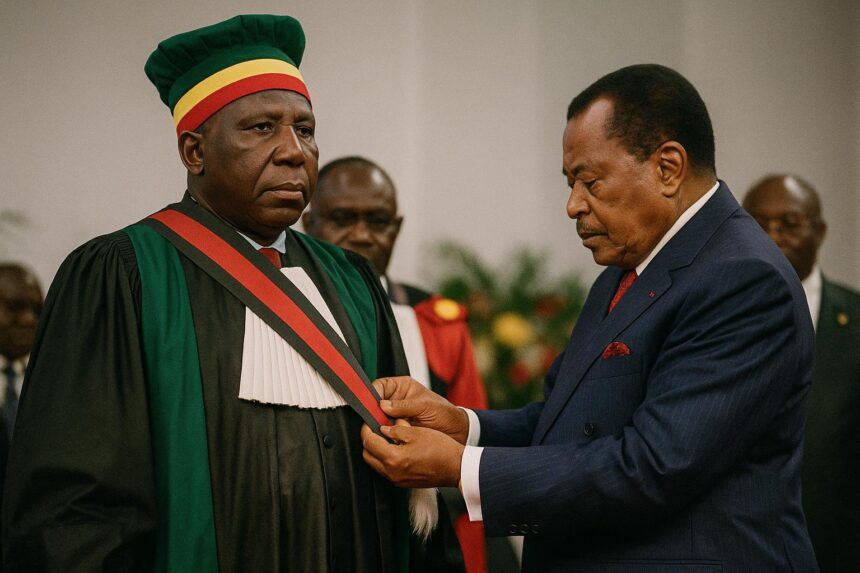Symbolic Ceremony in Brazzaville
On 25 July, under the high coffered ceiling of the Palais des Congrès, President Denis Sassou Nguesso personally fastened the crimson sash and star of the Grand-Cross of the Order of Merit on Professor Théophile Obenga. The gesture, delivered before cabinet members, senior officers and an attentive diplomatic corps, turned the usual choreography of state decoration into a moment of studied pageantry, meticulously relayed by Télé Congo and regional outlets (Agence Congolaise d’Information, 2025).
A presidential decree read aloud by the Master of Ceremonies framed the award as recognition for “exceptional services to knowledge and to the Nation.” Applause filled the hall when the 89-year-old laureate, visibly moved, inclined his head in acknowledgment. Observers noted the inclusion of foreign ambassadors from UNESCO-affiliated states, a subtle reminder that Brazzaville seeks to anchor its cultural credentials well beyond its borders.
Profile of an African Polymath
Born in Mbaya in 1936, Théophile Obenga rose from provincial classrooms to the Sorbonne, where his doctoral thesis on ancient Egyptian linguistics challenged prevailing Eurocentric paradigms (UNESCO archives, 1991). His bibliography now exceeds fifty volumes, spanning comparative history, philology and philosophical essays that found resonance in African universities from Dakar to Addis Ababa. The Congolese scholar’s participation in UNESCO’s International Committee for the Drafting of the General History of Africa earned plaudits for insisting on an endogenous narrative of the continent’s past.
Beyond academia, Obenga’s public service record is equally dense: Minister of National Education in the 1980s, Senator of the Republic in the early 2000s, and currently Personal Representative of the President for the Development of Higher Education. Colleagues still cite his 2018 address to the African Union, where he urged governments to “graduate from commodity reliance to cognitive sovereignty” (Jeune Afrique, October 2019).
National Merit as Soft-Power Instrument
Orders of merit occupy a strategic niche in the Congolese diplomatic toolkit, weaving prestige at home with calibrated visibility abroad. By elevating a figure whose scholarship commands reverence across Francophone and Anglophone circles, Brazzaville projects an image of intellectual stewardship that dovetails with its candidatures in multilateral fora such as the African Peer Review Mechanism.
Political analysts in Pointe-Noire observe that the choice of Obenga offers a narrative of continuity: a veteran intellectual aligned with national ideals, yet cosmopolitan enough to resonate with external partners. The accolade therefore reinforces the administration’s positioning as guardian of both cultural heritage and forward-looking modernity, without provoking partisan fault lines.
Academic Renaissance and Youth Engagement
During the ceremony, Minister of Higher Education Delphine Edith Emmanuel traced Obenga’s path before pivoting to current reforms, including the 2024 Framework Law on University Autonomy and the forthcoming Digital Learning Hub in Oyo, partially financed through an African Development Bank facility. In her words, the Grand-Cross “encapsulates the benchmark for excellence we expect our students to emulate.”
The laureate reciprocated by dedicating the distinction to Africa’s youth, reminding them that “knowledge is the first frontier of sovereignty.” His remark dovetails with the National Strategy for Scientific Innovation, launched last year to nurture researchers in agro-ecology, renewable energy and heritage conservation. Early data from the Ministry suggest a 12 percent rise in postgraduate enrolment since the programme’s inception.
Regional Context and Forward Outlook
In a region where headlines often gravitate toward security dilemmas, Congo-Brazzaville has leveraged cultural diplomacy to craft a less confrontational, more aspirational narrative. The Obenga decoration follows the 2023 inauguration of the Pan-African Writers’ Square in Brazzaville and the country’s co-hosting of the Central African Academic Forum, indicating a deliberate sequencing of soft-power overtures.
Looking ahead, diplomatic sources in Addis Ababa suggest that Professor Obenga could soon be proposed to chair a continental working group on heritage repatriation, a portfolio aligned with his lifelong preoccupation with African agency. Whether or not that appointment materialises, the Grand-Cross ceremony has already broadened the bandwidth through which Congo-Brazzaville communicates its priorities: rigorous scholarship, cultural affirmation and constructive engagement with the international community.




















